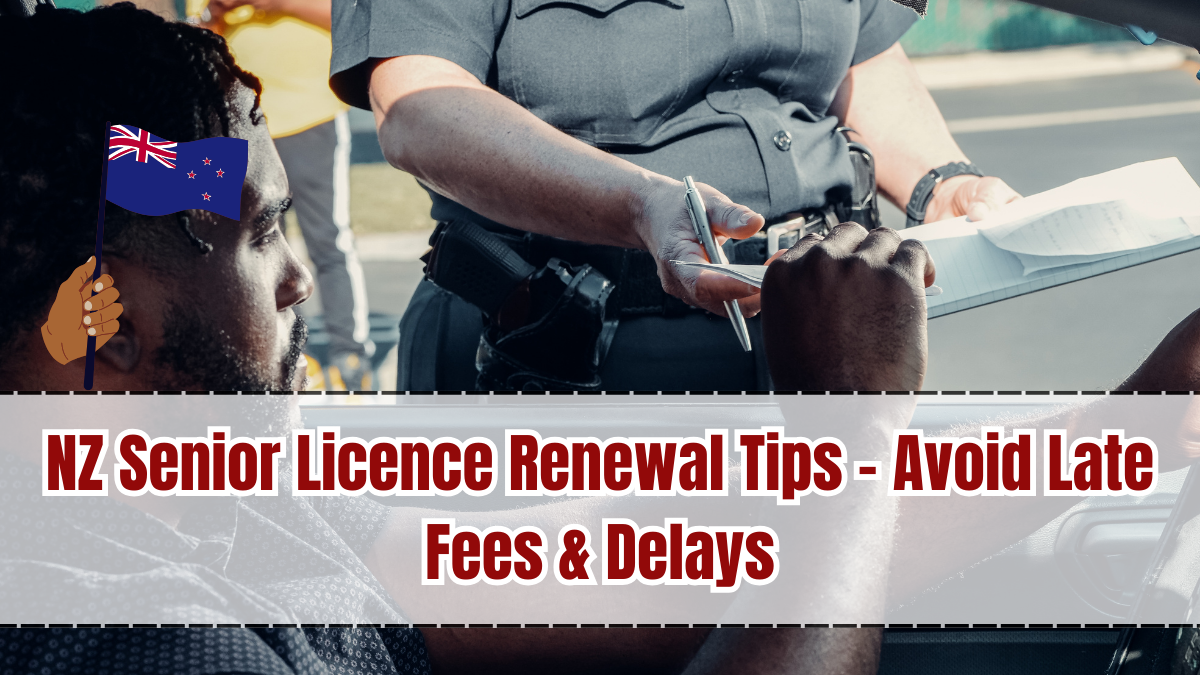For seniors in New Zealand, holding a valid driver’s licence is more than just a convenience—it is a lifeline to independence, mobility, and community participation. As people age, the New Zealand Transport Agency (NZTA) requires drivers to meet certain medical and vision standards to ensure road safety. Renewing a licence on time is essential not only to avoid penalties and late fees but also to maintain the freedom to travel and manage daily activities without disruption. This guide provides essential tips for senior licence renewal in New Zealand and outlines how to make the process smoother in 2025 and beyond.

Why Licence Renewal is Important for Seniors
Unlike younger drivers, seniors face more frequent renewal requirements. This is because age can affect reflexes, vision, and overall health, which are crucial for safe driving. By renewing on time, seniors ensure they:
-
Remain compliant with legal requirements.
-
Avoid late renewal penalties or suspension of driving rights.
-
Demonstrate that they are medically and visually fit to drive.
-
Maintain access to essential services, social activities, and independence.
The renewal process also provides an opportunity for health professionals to identify and address any potential risks that may affect driving ability.
When Do Seniors Need to Renew Their Licence?
The rules for senior licence renewal in New Zealand are clear:
-
At age 75, drivers must renew their licence.
-
At age 80, another renewal is required.
-
After 80, renewals are required every two years.
This ensures that older drivers continue to meet health and safety standards as they age.
Renewal Process for Seniors
The process of renewing a driver’s licence involves several key steps:
-
Obtain a Medical Certificate: Seniors must visit their doctor for a medical check-up. The doctor will evaluate overall health, vision, and fitness to drive. In some cases, further assessments such as specialist reports or on-road driving tests may be required.
-
Complete the Application Form (DL1): This form is available at driver licensing agents such as AA or VTNZ offices.
-
Provide Identification and Photos: Seniors must bring identification documents and will have a new photo taken for the licence.
-
Pay the Renewal Fee: Fees vary depending on the testing requirements, but seniors should budget for both the medical exam cost and the licensing fee.
-
Submit the Application: Applications must be submitted in person to ensure proper verification.
Common Mistakes Seniors Make
Many seniors unintentionally face late fees or driving interruptions because of avoidable mistakes. Some of the most common errors include:
-
Waiting too long to book a doctor’s appointment for the medical certificate.
-
Forgetting renewal deadlines and only realizing after the licence has expired.
-
Not updating personal details such as address or contact information, causing missed notices.
-
Assuming they are automatically eligible without accounting for medical checks.
By staying proactive, these issues can easily be avoided.
Tips to Avoid Late Fees and Delays
Seniors can follow a few practical strategies to ensure smooth renewal:
-
Mark renewal dates on a calendar well in advance, especially after age 75.
-
Book medical appointments early, ideally two to three months before the expiry date.
-
Switch to direct reminders by registering for NZTA notifications via email or text.
-
Keep health records updated with doctors to avoid delays in medical certification.
-
Carry out a self-assessment of driving ability, and if necessary, arrange refresher driving lessons.
By preparing ahead, seniors can avoid stressful last-minute renewals and costly late fees.
Costs Involved in Renewal
The total cost of renewing a senior driver’s licence generally includes two components:
-
Medical assessment fees: Charged by the doctor, typically ranging from NZ$50 to NZ$80 depending on the clinic.
-
NZTA licensing fees: Paid to the driver licensing agent at the time of application.
Additional costs may apply if the senior is required to take a practical on-road driving test or provide specialist reports.
Importance of Medical and Vision Checks
Safety is at the core of senior licence renewal requirements. Doctors and optometrists play a vital role in ensuring seniors can drive safely by checking:
-
Vision: Clarity, depth perception, and peripheral awareness.
-
Reflexes and mobility: Ability to respond quickly to road conditions.
-
Cognitive health: Awareness, decision-making, and judgment.
If there are concerns, the senior may be asked to undergo a practical driving test. While this may feel daunting, it is meant to ensure the safety of both the driver and others on the road.
Benefits of Timely Renewal
Renewing on time is not just about avoiding penalties—it brings peace of mind. Seniors can continue driving without interruption, plan travel confidently, and maintain access to healthcare, shopping, and family visits. Additionally, renewing on time demonstrates responsibility, reinforcing confidence among family members and the wider community.
FAQs
At what age do seniors need to renew their licence in New Zealand?
Seniors must renew their licence at 75, again at 80, and every two years thereafter.
What documents are required for renewal?
You need a completed DL1 application form, a medical certificate from a doctor, identification, and payment for the renewal fee.
Can a doctor refuse to certify me as fit to drive?
Yes. If a doctor believes you are unfit to drive safely, they can decline certification. In such cases, additional medical assessments or driving tests may be required.
How much does senior licence renewal cost?
Costs include the medical exam fee (about NZ$50–80) and the NZTA licence fee, with extra costs if further testing is needed.
How can I avoid late renewal penalties?
Mark renewal dates early, book medical appointments in advance, and keep your details updated with NZTA to receive reminders.
Click here to know more.




